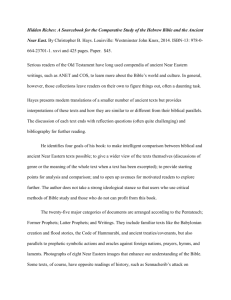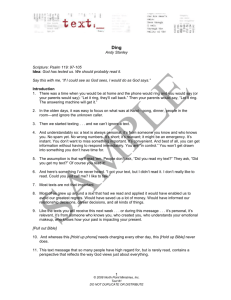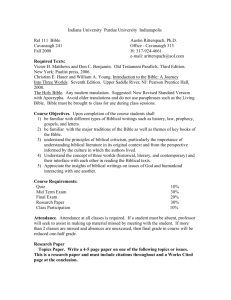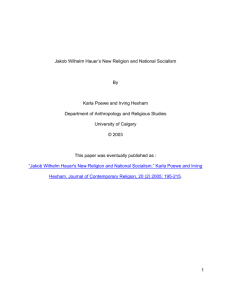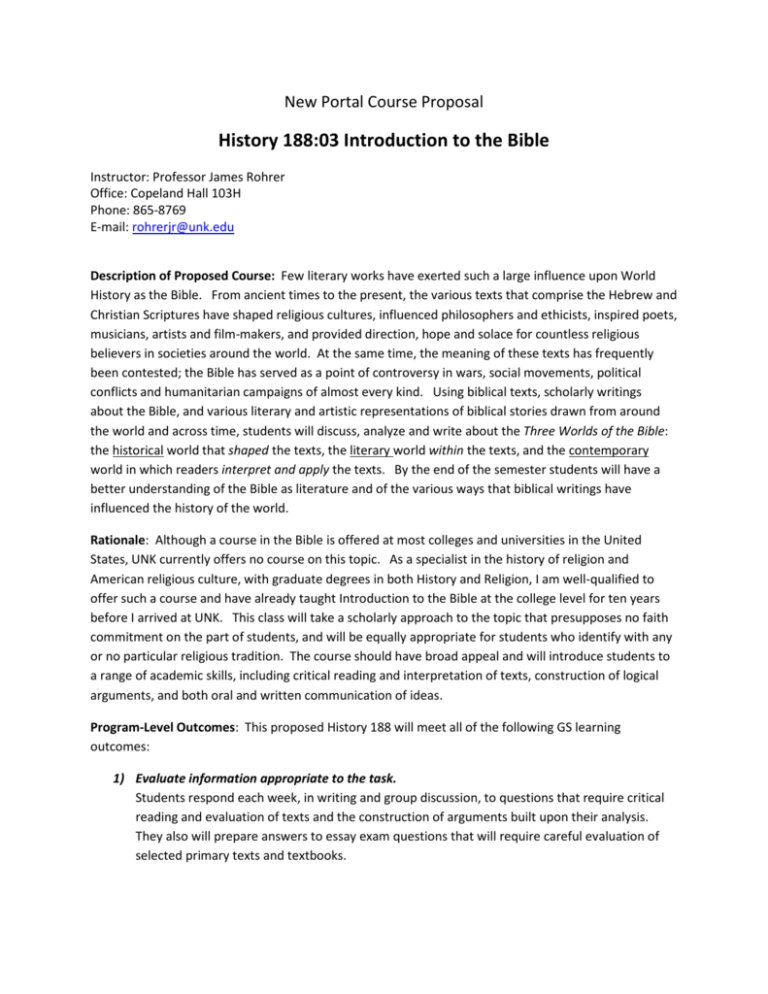
New Portal Course Proposal
History 188:03 Introduction to the Bible
Instructor: Professor James Rohrer
Office: Copeland Hall 103H
Phone: 865-8769
E-mail: rohrerjr@unk.edu
Description of Proposed Course: Few literary works have exerted such a large influence upon World
History as the Bible. From ancient times to the present, the various texts that comprise the Hebrew and
Christian Scriptures have shaped religious cultures, influenced philosophers and ethicists, inspired poets,
musicians, artists and film-makers, and provided direction, hope and solace for countless religious
believers in societies around the world. At the same time, the meaning of these texts has frequently
been contested; the Bible has served as a point of controversy in wars, social movements, political
conflicts and humanitarian campaigns of almost every kind. Using biblical texts, scholarly writings
about the Bible, and various literary and artistic representations of biblical stories drawn from around
the world and across time, students will discuss, analyze and write about the Three Worlds of the Bible:
the historical world that shaped the texts, the literary world within the texts, and the contemporary
world in which readers interpret and apply the texts. By the end of the semester students will have a
better understanding of the Bible as literature and of the various ways that biblical writings have
influenced the history of the world.
Rationale: Although a course in the Bible is offered at most colleges and universities in the United
States, UNK currently offers no course on this topic. As a specialist in the history of religion and
American religious culture, with graduate degrees in both History and Religion, I am well-qualified to
offer such a course and have already taught Introduction to the Bible at the college level for ten years
before I arrived at UNK. This class will take a scholarly approach to the topic that presupposes no faith
commitment on the part of students, and will be equally appropriate for students who identify with any
or no particular religious tradition. The course should have broad appeal and will introduce students to
a range of academic skills, including critical reading and interpretation of texts, construction of logical
arguments, and both oral and written communication of ideas.
Program-Level Outcomes: This proposed History 188 will meet all of the following GS learning
outcomes:
1) Evaluate information appropriate to the task.
Students respond each week, in writing and group discussion, to questions that require critical
reading and evaluation of texts and the construction of arguments built upon their analysis.
They also will prepare answers to essay exam questions that will require careful evaluation of
selected primary texts and textbooks.
2) Apply principles of critical thinking to demonstrate integrative learning.
The modern field of Biblical Studies is inherently interdisciplinary, drawing upon such varied
disciplines as History, Anthropology, Archaeology, Sociology, Literary Criticism, Linguistics,
Religious Studies, Theology, Post-Colonial Studies, Women’s Studies and Gender Studies among
others. This course introduces students to various different forms and methods of textual
criticism as well as other kinds of criticism (e.g. Reader-Response Criticism, Socio-Cultural,
Historical, Post-Colonial/Liberationist, etc.), as well as the history and culture of the Ancient
Near East, of Second Temple Judaism, and the Roman Empire. Each chapter of the main text
presents the relevant historical, cultural and literary information necessary to place biblical texts
within their historical and cultural contexts, as well as discussion of how various readers have
interpreted the texts in divergent ways in different historical eras and cultures. Finally each
chapter challenges students to read and interpret for themselves selected texts that have
proven particularly influential and contentious in World History, and provides a format for
debating the various historical applications of these selected texts. Thus, the textbook is
intentionally interdisciplinary and integrative.
3) Communicate effectively in oral form.
Class discussion and formal debates will be a key element of the grade.
4) Communicate effectively in written form.
Students must engage in Blackboard discussion each week, will write two essay exams, and will
prepare a formal paper.
5) Analyze cultural issues within a global context.
This is the heart of the class. Students will analyze ancient texts within their historical/cultural
contexts, but also study the history of selected texts, learning how they have constantly been
reinterpreted and applied in manifold ways within many different historical settings (e.g. royal
absolutism vs. limited constitutional monarchy; pacifism vs. Just war; struggles over slavery and
women’s rights in Victorian America and Britain; Colonialism and Apartheid; Colonial
Revolutions; Liberal Economics and Socialism; etc.). So the readings and discussion each week
will range from ancient history to World History to contemporary social and political questions
confronting societies around the world.
6) Evaluate in context significant concepts relating to democracy.
As an extension of pt. 5, many of the issues that students will analyze and discuss involve the
historical uses of biblical texts in conflicts over political authority, wealth distribution, race
relations, etc. Regardless of what positions students might take, they will have no way to avoid
discussing issues that are in the daily news everywhere in the world and that are at the heart of
liberal democracy.
Category Outcomes: This proposed History 188 will meet each of the Portal Outcomes:
1) Analyze critical issues confronting the individual and society, including a global context.
The biblical texts themselves grapple with all the big issues: good and evil; justice and injustice;
the nature of the “good life” and the “good society”; sickness and death; the individual and
community (individualism vs. collectivism); war and peace; political legitimacy; civil
disobedience; gender relations; class relations; etc. etc. The texts and discussion assignments
will acquaint students with how individuals and communities have used selected texts to
understand these existential problems within many different cultures and historical eras. In the
process of grappling with this material, students will necessarily have to think critically about
their own personal beliefs about the problems under consideration.
2) Interpret an argument through engaged discourse within the discipline.
The students will be constantly reading ancient primary source material and scholarly literature
written by historians, social scientists and literary critics, and will need to engage in weekly oral
and written discussion assignments that require them to interpret these texts and construct
arguments based upon their conclusions.
3) Construct a cogent argument pertaining to the course topic.
The weekly discussion posts, essay exam prompts, and final paper assignment will all require
students to construct arguments. Hopefully they will become increasingly cogent during the
course of the semester!
History 188.03
Portal: Introduction to the Bible
Spring 2015
Instructor: Professor James Rohrer
Office: Copeland Hall 103H
Phone: 865-8769
E-Mail: rohrerjr@unk.edu
Office Hours: TBA
Course Description: Few if any other literary works have exerted such a large influence upon World
History as the Bible. From ancient times to the present, the various texts that comprise the Hebrew and
Christian Scriptures have shaped religious cultures, influenced philosophers and ethicists, inspired poets,
musicians, artists and film-makers, and provided direction, hope and solace for countless religious
believers in societies around the world. At the same time, the meaning of these texts has frequently
been contested; the Bible has served as a point of controversy in wars, social movements, political
conflicts and humanitarian campaigns of almost every kind. Using biblical texts, scholarly writings
about the Bible, and various literary and artistic representations of biblical stories drawn from around
the world and across time, students will discuss, analyze and write about the Three Worlds of the Bible:
the historical world that shaped the texts, the literary world within the texts, and the contemporary
world in which readers interpret and apply the texts. By the end of the semester students will have a
better understanding of the Bible as literature and of the various ways that biblical writings have
influenced the history of the world.
GS Program Level Learning Outcomes:
At the end of the class students will be better able to
1.
2.
3.
4.
Evaluate information appropriate to the task;
Apply critical thinking to demonstrate integrative learning;
Communicate effectively in written form;
Analyze cultural issues within a global context.
GS Portal Course Outcomes:
At the end of the class students will be better able to
1. Analyze in their global context critical issues confronting the individual and society;
2. Interpret arguments through engaged discourse within the discipline of history;
3. Construct a cogent argument pertaining to the course topic.
Course Goals and Objectives:
At the end of the class students will be better able to
1. Understand the historical contexts of biblical texts. (GS 1, 4; Portal Objectives 1 & 2)
2. Understand the literary world created by the biblical texts. (GS 1, 4; Portal Objectives 1 & 2))
3. Understand the dynamic nature of exegesis—how people read and interpret texts within new
and changing contemporary contexts. (GS 1, 2, 4; Portal Objectives 1 & 2)
4. Understand how the Bible has historically been read or heard and applied differently by
different groups and individuals in various cultural settings. (GS 1, 4; Portal Objectives 1 & 2)
5. Understand the influence of the Bible upon World History. (GS 1, 2 & 4; Portal Objectives 1 & 2)
6. Analyze primary sources critically. (GS 1, 2 & 4; Portal Objectives 1 & 2)
7. Develop cogent arguments through writing and class discussions on the themes of the course.
(GS 1 & 3; Portal Objectives 1,2 & 3)
Course Requirements: Class material will be presented through a mix of lecture, class and small group
discussions, oral presentations, writing assignments, and film analysis. Students are expected to attend
class regularly, pay attention during lectures and presentations, and actively participate in discussions.
It is essential that students keep up with assigned readings and complete every weekly assignment by
the scheduled dates. Good attendance is mandatory for success in this class.
There will be an in-class midterm essay exam and a final essay exam. Make-up exams will be given only
in exceptional and documented cases, and must be arranged in advance. Travel plans that conflict with
an exam will not normally qualify for a makeup.
The writing assignment for History 188 is a 4-5 page typed paper on the use of the Bible in a selected
modern social controversy. This paper will be posted on an electronic portfolio, which is part of the
General Studies requirement. More details about this paper, and the process for posting it, will be
given out later.
In addition students will write responses to questions posed by the weekly readings, and post these on
Blackboard. Students will be assigned to discussion groups, and must respond to the posts of each
group member. To receive full credit these responses must be well-considered and appropriate
comments that show your familiarity with the assigned readings for the week and need to be submitted
by the assigned due dates. (Note: Brief perfunctory remarks such as “Dan, very thoughtful!” or “I don’t
really care,” or “I can kinda see both sides” do NOT constitute well-considered comments. I want to see
students engaging the texts and critically thinking!)
Academic misconduct of any kind is unacceptable. Students who plagiarize or engage in other forms of
misconduct will receive a failing grade for the course and may face expulsion from the University.
Grade distribution: Midterm (25%), Final Exam (25%), Paper (25%), Participation (25%) (Participation
includes attendance, timely completion of Blackboard discussions, active classroom discussion, and
appropriate class conduct).
Disabilities: UNK seeks to provide flexible and individualized reasonable accommodation to students
with documented disabilities or those who are pregnant. Any student needed accommodation due to
pregnancy should visit with Student Health. To receive accommodation for a disability, students must
register with UNK Disability Services Coordinator David Brandt in the Academic Success Office, 163
Memorial Student Affairs Building (308)865-8214, or by email at brandtdl@unk.edu.
Textbooks: The following textbooks are required for this class.
The New Oxford Annotated Bible with Apocrypha (RSV): An Ecumenical Study Bible (New York: Oxford
University Press, 2010). 2010 is the most recent 4th edition, but any earlier edition of the New Oxford
Annotated RSV will also be acceptable.
Christian E. Hauer & William A. Young, An Introduction to the Bible: A Journey Into Three Worlds, 6th
Edition (Upper Saddle River, NJ: Pearson Prentice Hall, 2005).
John Riches, The Bible: A Very Short Introduction (New York: Oxford University Press, 2000).
There will also be occasional short handouts of primary historical documents.
Schedule (Note: This may be subject to changes at the instructor’s discretion):
Week 1: Introduction & the Three Worlds of the Bible
Hauer & Young, Ch. 1; Riches, Ch. 1; New Oxford Annotated Bible, Preface to the RSV.
Week 2: Methods Used by Biblical Scholars
Hauer & Young, Ch. 2; Riches, Ch. 2-3; Genesis 1 & 2
Week 3: Origins: The Book of Genesis
Hauer & Young, Ch. 3; All read Genesis 3-12; All choose from among the following options: Genesis 1325 (Abraham & Sarah), Genesis 25-36 (Isaac & Rebekah, Jacob & Rachel), Genesis 37-50 (Joseph &
Brothers).
Week 4: Covenant: Exodus, Leviticus, Numbers & Deuteronomy
Hauer & Young, Ch. 4; Exodus 1-24; Numbers 14; Leviticus 18-19; Deuteronomy 6:1-25, 20:1-20, 30:1-20.
Week 5: The Nation Israel (The Former Prophets)
Hauer & Young, Ch. 5; Joshua 1-12; Judges 1-2; Judges 4-5; 2nd Samuel 9-20; 1st Kings 1-2.
Week 6: The Prophets of Israel (The Latter Prophets)
Hauer & Young, Ch. 6; Amos; Isaiah 1-11, 40-55; Jeremiah 1-7, 20:7-12
Week 7: The Writings Part 1: Sacred Songs & Wisdom
Hauer & Young, Chs. 7 & 8; Psalms 1, 8, 13, 23, 24, 29, 44, 51, 73, 90, 104; 121, 137; 139, 150; Song of
Songs; Book of Lamentations; Proverbs 1-6; Job 1-7, 28, 38-42; Ecclesiastes 1-3, 8:16-9:18, 12.
Week 8: The Rest of the Writings
Hauer & Young, Ch. 9; Ruth; Esther; Daniel 7-12
Week 9: Jewish Life & Literature 200 B.C.E. – 100 C.E.
Hauer & Young, Ch. 10; Daniel 1-6; Tobit; 1st Maccabees 1-4; Tractate Aboth 1-3 (Mishnah)
Week 10: Jesus of Nazareth in the World of Second Temple Judaism
Hauer & Young, Ch. 11; Gospel of Mark
Week 11: The Gospels: Proclaiming Jesus in different Communities
Hauer & Young, Ch. 12; Mk 1:1-20, Mt. 1:1-4:17, Lk 1:1-3, Jn 1:1-51; Mk 10:17-31, Mt 19:16-30, Lk
18:18-30; Mt 11:4-6, Lk 4:16-21, Lk 6:20, 10:29-37, 12:13-21, 14:12-24; 19:1-10, Jn 12:6, 13:29; Mt 5:312, Lk 6:17, 20-23; (Mk 15:33-16:8, Mt 27:45-28:15, Lk 23:44-24:35, Jn 19:28-20:29); Mk. 12:28-34, Mt
22:24-40, Lk 10:25-28; Lk 1:26-56, 8:2-3, 10:38-42, Mt 28:1-10, Jn 20:1-18
Week 12: The Birth of Christianity: Acts and Paul, Jews and Gentiles
Hauer & Young, Chs. 13-14; Acts 1-2, 9, 17:16-34; 1st Thessalonians; 1st Corinthians 1-2, 12-14; Galatians
3-6; Romans 1-3, 8-13; Ephesians
Week 13: Development of the post-Apostolic Church (70-150 C.E.)
Hauer & Young, Ch. 15; First Timothy; Hebrews 1-3, 11-13; James; First John; Revelation 1, 4-8, 12-14,
20-22; Gospel of Thomas (Coptic)
Week 14: Influence of the Bible on History
Riches, Chs. 4-6
Week 15: Influence of the Bible on High & Popular Culture
Hauer & Young, Ch. 16; Riches, Chs. 7-9





